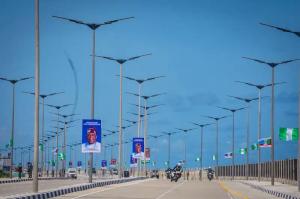Landmark $747 Million Syndicated Loan Secured for Phase 1 Section 1 of the Lagos-Calabar Coastal Highway
Nigeria secures $747M loan for Lagos-Calabar Highway Phase 1, marking a historic milestone in infrastructure and global investor confidence.
LAGOS, NIGERIA, July 10, 2025 /EINPresswire.com/ -- In a historic milestone for Nigeria’s infrastructure development, Deutsche Bank has led a $747 million syndicated loan to finance Phase 1 Section 1 of the Lagos-Calabar Coastal Highway—a critical component of Nigeria’s Renewed Hope Infrastructure Development Agenda.Covering 47.47 kilometers from Victoria Island to Eleko Village, this section represents the first leg of what will become a vital trade and transport corridor along Nigeria’s southern coast. This is the largest syndicated loan ever secured for a Nigerian road project and sets a new precedent for international investor confidence in the country's infrastructure pipeline.
Global Syndicate with Strong Institutional Support
Deutsche Bank served as Global Coordinator, Initial Mandated Lead Arranger, and Bookrunner, participating alongside a diverse syndicate of lenders and institutions:
- First Abu Dhabi Bank (Facility Agent & Intercreditor Agent)
- African Export-Import Bank (Afrexim)
- Abu Dhabi Exports Office (ADEX)
- ECOWAS Bank for Investment and Development (EBID)
- Nexent Bank N.V. (formerly Credit Europe Bank N.V.)
- Zenith Bank, through its UK, Paris, and Nigeria offices
The Islamic Corporation for the Insurance of Investment and Export Credit (ICIEC) provided political and commercial risk insurance coverage, reinforcing the project’s attractiveness to lenders and ensuring robust risk mitigation.
Strategic EPC+F Delivery Model
The project is executed under an EPC+F (Engineering, Procurement, Construction + Financing) contract with Hitech Construction Company Limited, one of Nigeria’s leading infrastructure firms. This structure facilitates close coordination between financing and project execution, ensuring both speed and accountability.
As of today, over 70% of Phase 1 Section 1 is already complete. The fast pace of progress highlights Nigeria’s renewed commitment to infrastructure delivery and capacity to attract global partnerships under well-structured frameworks.
Built for the Future: CRCP Technology
The Lagos-Calabar Coastal Highway is being constructed using Continuously Reinforced Concrete Pavement (CRCP), a cutting-edge technique that ensures:
- A minimum lifespan of 50 years
- Low maintenance costs
- High resistance to environmental and usage stress
- This design guarantees long-term value for money and resilience, helping Nigeria build sustainable infrastructure that meets international standards.
High Standards, Strong Due Diligence
The project underwent extensive due diligence—including technical, legal, environmental, and social assessments—to ensure compliance with global norms and best practices. This robust process affirms the integrity and viability of the project, strengthening investor confidence and reducing execution risk.
Economic Impact and Vision
The Lagos-Calabar Highway is not just a transport route—it’s a national strategic asset. Once complete, it will:
- Enhance regional trade and logistics
- Promote tourism and local business growth
- Reduce transport costs and travel time
- Create thousands of jobs across the value chain
- Support inclusive and sustainable economic development
- A tolling strategy is being finalized to ensure the project’s long-term financial sustainability through a concession-backed framework. Financing for subsequent phases of the highway is already being structured, with strong interest from regional and international investors.
Statements from Key Stakeholders
Wale Edun, Minister of Finance and Coordinating Minister of the Economy, Federal Republic of Nigeria:
“This deal reflects the success of our macroeconomic reforms and the return of international capital to support Nigeria’s development. We are focused on financing infrastructure in ways that are sustainable, transparent, and catalytic—and this transaction is a model of that vision in action. The closing of this market-defining financing is yet another testament to Mr President’s commitment to accelerate the participation of the private sector in infrastructure financing and development. It positions the country as being ready for a full transition to the design, development, financing as well as operations and management of critical public infrastructure through Public Private Partnerships. It signals to investors and private sector participants, the sophistication and maturity of the Nigerian market and commitment of the Government to sanctity of contracts and innovative structures to fund critical national infrastructure that will deliver sustained and inclusive growth.”
Hon. David Umahi, Minister of Works, Federal Republic of Nigeria:
“This transaction is a vote of confidence in Nigeria’s economic reform agenda. The Lagos-Calabar Highway is a strategic national asset, and this financing sets a strong precedent for future public-private infrastructure partnerships.”
Dany Abboud, Managing Director, Hitech Construction Company Limited:
“We are proud to deliver this historic project. With over 70% of Phase 1 Section 1 complete, we are showing that Nigerian engineering—backed by structured international finance—can meet global standards. The use of CRCP technology ensures unmatched durability and cost-efficiency.”
Dr. Khalid Khalafalla, CEO, ICIEC:
“ICIEC is proud to join the Nigerian government and our co-financiers in realizing the Lagos–Calabar Coastal Highway Project. Through ICIEC’s sovereign risk coverage solution, we are unlocking vital infrastructure that will ease congestion, stimulate regional trade, and drive inclusive economic growth. This initiative will create employment opportunities, build local capacity, and bolster small and medium-sized enterprises, demonstrating our steadfast commitment to sustainable development, multimodal connectivity, and prosperity for communities across West Africa.”
About the Project
The Lagos-Calabar Coastal Highway is envisioned as a transformative corridor linking Nigeria’s coastal states with improved access, mobility, and economic opportunity. The highway is part of Nigeria’s broader Renewed Hope Infrastructure Development Plan, which seeks to unlock private sector investment and deliver catalytic infrastructure under a sustainable financing model.
Phase 1 Section 1—currently over 70% complete—lays the foundation for future segments and broader regional integration through improved logistics, trade, and transport connectivity.
Nader
Africa
email us here
Legal Disclaimer:
EIN Presswire provides this news content "as is" without warranty of any kind. We do not accept any responsibility or liability for the accuracy, content, images, videos, licenses, completeness, legality, or reliability of the information contained in this article. If you have any complaints or copyright issues related to this article, kindly contact the author above.

